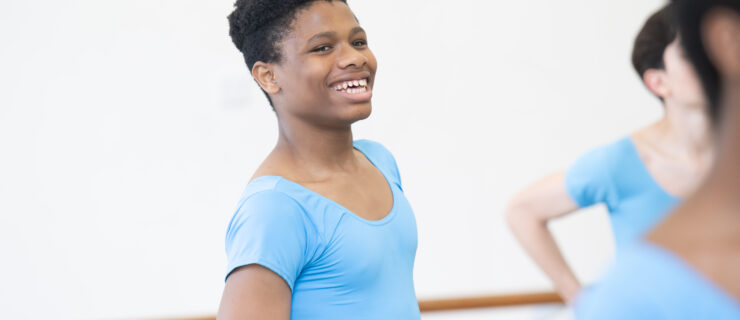College-Prep Timeline
Juilliard dancers in Nacho Duato’s Gnawa (photo by Nan Melville)
If you’re planning to dance in college, chances are you’ve been pondering life after high school for quite some time—and that’s a good thing. “It’s never too early to start thinking about college,” says Alison Green, an advisor at Minnesota’s Saint Paul Conservatory for Performing Artists. Many collegiate dance programs require an extra application step—that dreaded audition—and waiting until the eleventh hour can add extra pressure to your decisions.
Not sure when to do what? Follow this timeline, which starts your freshman year of high school, to help you stay on top of college prep and keep the process as stress-free as possible.
Your freshman year:
• Start forming a general list of schools that may interest you. Then, look at those schools’ academic requirements, says Kate Walker, dance department coordinator at Booker T. Washington High School for the Performing and Visual Arts in Dallas, TX. If one university requires its applicants to have taken three years of a foreign language, for instance, it won’t be too late to fit that third year of French into your schedule.
• Start a running list of activities and accomplishments, including any major performances, awards, summer intensives and master classes.
Your sophomore year:
• Look back at your preliminary list of schools, and start thinking more deeply about your interests and what you’re looking for in a dance program. Do you want to cross off any schools? Add new ones? Now is a good time to fine-tune the list.
• Start planning college visits, which can begin as early as your sophomore year and continue until the fall of your senior year. If possible, drop by college campuses when school is in session and students are around so you can get the most out of your trip. “Ask if you can watch dance classes, and definitely go see a student performance,” says Donna Faye Burchfield, director of the School of Dance at the University of the Arts, in Philadelphia, PA.
• Many colleges ask for teacher recommendations with your application. Green says that sophomore year is a good time to start developing relationships with dance instructors or your favorite academic teachers whom you might ask to write those letters of recommendation. “Be a leader in class and ask for their advice,” Green says ”You want to make sure they get to know you.”
The summer between your sophomore and junior years:
• Many college dance programs offer summer intensives for prospective students. Attending one can be a great way to determine if you like a particular school—and keep up your training during the summer break. “You can get a slice of what life may be like at that college or university,” Walker says.
• “Start doing some research on what the curriculum looks like at your prospective schools,” Walker says. Do you want a school that focuses on a certain technique? One that gives students opportunities to choreograph? Ask yourself if you’re leaning toward a conservatory program (with a BFA track), or if you might want to double-major and focus on schools with BA programs.
Your junior year:
Fall:
• Remember that list of activities and awards you started your freshman year? Now’s the time to transform it into your college-application resumé. Be sure to include your academic and dance achievements, along with any clubs, volunteer work or part-time jobs you do outside of school or dance.
• Attend college open houses and fairs—you may discover programs you hadn’t previously considered.
Spring:
• Take the SAT and/or ACT. If you wait until senior year to take these tests, Green warns, you’ll have fewer early-application options. This also gives you time to retake the test if you’d like.
• Study! “Many schools will make admissions decisions based on junior grades,” Green says.
• Research scholarship opportunities. Find out each scholarship’s specific requirements.
• Ask teachers for recommendations—and give them a deadline of at least two weeks before they’re due. Walker advises asking teachers in person and then following up with an email that includes your resumé. Having that information handy will make it easier for your teachers to write personalized recommendations.
The summer between your junior and senior years:
• Choose a solo you’ll use for college auditions and start polishing it. It can be something you’ve already performed, or you can choreograph one yourself.
• Write the first draft of your application essay(s).
• Finalize the list of schools you want to apply to and take note of each program’s application deadlines and audition requirements. Don’t forget about the documents you’ll need, such as transcripts, letters of recommendation and income records (for financial aid packages).
• Try to take a few master classes in unfamiliar techniques, like modern or African dance. These new experiences will give you a leg up before auditions, which can often include styles you might not be comfortable with.
Your senior year:
Fall:
• Schedule auditions. If the school allows, Burchfield recommends taking a class with current students while you’re on campus. Some programs will even count the class as your audition.
• Present yourself professionally online. This might include limiting public access to your social media accounts or adjusting how others can tag you. “You should always be the one in control of your internet presence,” Green says—not your friends.
• Complete and submit all applications, and make sure your transcripts and recommendations are in order. If you’re applying to conservatories, keep in mind that there might be a supplement to the Common Application (or even a supplement to a school’s individual app) where you’ll be asked about your dance training. Don’t procrastinate! Walker says students often underestimate how much time these additional applications can take.
Spring:
• Fill out the Free Application for Federal Student Aid (FAFSA), which is available January 1.
Post-application:
Congratulations—you did it! Beware of falling victim to senioritis, though: Colleges will still look at grades from your final semester. And remember to finalize your plans quickly. Most final decisions are due by May 1, the national college acceptance deadline.



